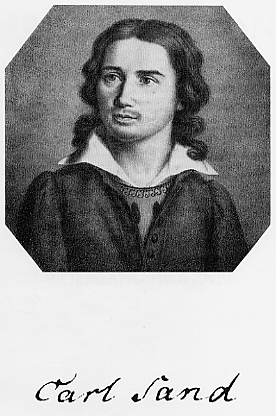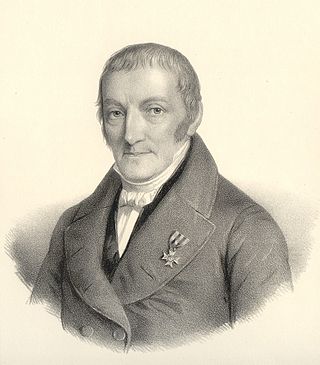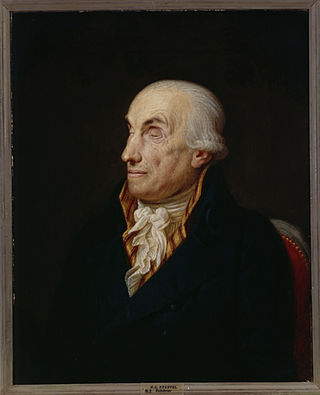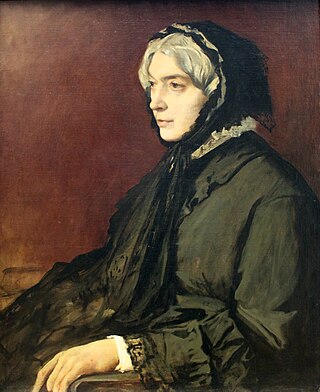Related Research Articles

Bettina von Arnim, born Elisabeth Catharina Ludovica Magdalena Brentano, was a German writer and novelist.

Karl Ludwig Sand was a German university student and member of a liberal Burschenschaft. He was executed in 1820 for the murder of the conservative dramatist August von Kotzebue the previous year in Mannheim. As a result of his execution, Sand became a martyr in the eyes of many German nationalists seeking the creation of a united German national state.

Karl Ludwig von Haller was a Swiss jurist, statesman and political philosopher. He was the author of Restauration der Staatswissenschaft, a book which gave its namesake to the Restoration period after the Congress of Vienna, and which Georg Wilhelm Friedrich Hegel strongly criticized in §258 of Elements of the Philosophy of Right.

Therese Huber was a German author. She was one of the so-called Universitätsmamsellen, a group of five academically active women during the mid-18th and early 19th centuries. The group consisted of daughters of academics at Göttingen University; Huber was noteworthy among them, alongside Meta Forkel-Liebeskind, Caroline Schelling, Philippine Engelhard, and Dorothea Schlözer.

Princess Wilhelmine of Baden, was by birth a Princess of Baden from the House of Zähringen and by marriage Grand Duchess consort of Hesse and by Rhine. Her descendants include King Charles III of the United Kingdom, King Felipe VI of Spain, and other members of European royalty.

Helmina von Chézy, née Wilhelmine Christiane von Klencke, was a German journalist, poet and playwright. She is known for writing the libretto for Carl Maria von Weber's opera Euryanthe (1823) and the play Rosamunde, for which Franz Schubert composed incidental music.

William II was the penultimate Elector of Hesse.

Karl Sebastian von Pfeufer was a German physician who was a native of Bamberg.

Karl Friedrich Becker was a German educator and historian. His most noted work was World History for Children and Teachers of Children which was widely used and much edited and revised by other noted historians after Becker's death.

Johann Martin Miller was a German theologian and writer. He is best known for his novel Siegwart, which became one of the most successful books at the time.

Lorenz von Westenrieder was a well-known author and historian in Bavaria and a critic of the Elector Karl Theordor and supporter of Maximilian IV Joseph. There are several memorials to him in Munich.

Ludwig Johann Karl Gregor Eusebius Freiherr Roth von Schreckenstein was a Prussian General of the cavalry and Minister of War.

Princess Maria Anna of Hesse-Homburg was a German noblewoman. She was the most senior woman at the Prussian court from 1810 to 1823. She was styled as "Princess Wilhelm of Prussia".

Franziska Christiane Johanna Friederike "Fanny" Tarnow was a German author. She wrote under the names Fanny Tarnow and F.T.

Gottlieb Konrad Pfeffel was a French-German writer and translator from the Pfeffel family. His texts were put to music by Ludwig van Beethoven, Joseph Haydn and Franz Schubert. He is sometimes also known as Amédée or Théophile Conrad Pfeffel, which is the French translation of Gottlieb ("Godlove").

Caroline Rudolphi was a German educationist and poet. Born to a poor family in Magdeburg and growing up in Potsdam, she was discovered by composer Johann Friedrich Reichardt, who in 1781 set to music and published a number of her poems. From 1778, Rudolphi served as educator to the daughters of the von Röpert family of Trollenhagen. In 1783, she opened her own educational institute at Trittau. Over the following years, Rudolphi became a widely known and respected educationist for girls. She became friends with Elise Reimarus, and at her institute she established a literary salon, attracting a circle of intellectuals such as Matthias Claudius, Friedrich Gottlieb Klopstock, Friedrich Heinrich Jacobi, Jens Baggesen.

Caroline Philippine von Briest was one of the most prolific German women writers of the Romantic period. She wrote novels, short stories, fairy tales, as well as essays, on Greek mythology, on the history of fashion, and travelogues. Her numerous works gained her a high degree of celebrity.

Caroline von Humboldt, née Carolina Friederica von Dacheröden, was a German salonnière and art historian.

Henriette Feuerbach was a German author and arts patron. She was the wife of Joseph Anselm Feuerbach and the stepmother of painter Anselm Feuerbach, whom she supported in his art.

Karl Friedrich Müchler was a German writer.
References
- ↑ Damen Conversations Lexikon (in German). Vol. 10. 1838. p. 465.